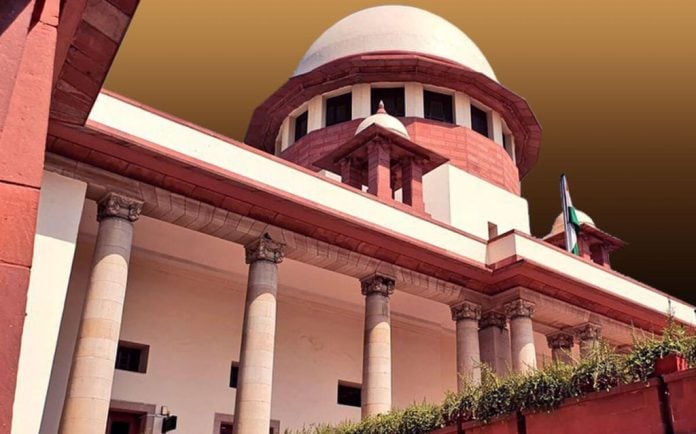The Supreme Court directed Congress leader Randeep Singh Surjewala to approach the Delhi High Court in the public interest litigation challenging the constitutional validity of Section 4 and 5 of the Election Law (Amendment) Act, 2021 amending Section 23 and 28 of the Representation of People Act, 1950.
The petitioner submitted that the said amendment infringes the fundamental right to privacy of the citizens of India and violates the right to equality as guaranteed to voters under Article 14 of the Constitution of India.
The bench of Justice D.Y. Chandrachud and Justice A.S. Bopanna while disposing of the matter, granted liberty to approach the Delhi High Court. The bench observed, “Why don’t you move to Delhi High Court for this? You can get the same remedy over there. You are challenging Sections 4 and 5 of the Election Law (Amendment) Act, 2021. Why have you come here when you can go to Delhi High court?…”
Advocate-on-record Nupur Kumar appeared before the Apex Court and apprised the court that three states will be going to elections within the next 6 months.
“In the view of the remedy, which is available in the law, we grant liberty to the petitioner to move a petition under Article 226 of the Constitution of India before the competent High Court,” the bench held.
The Election Laws (Amendment) Act, 2021
The Election Laws (Amendment) Bill, authorizing the linking of Aadhaar with Voter ID cards, was passed by the Lok Sabha through a voice vote in December 2021.
The law aims to weed out duplication in the election process and seeks to link Aadhaar cards with electoral rolls by voice vote. The Law Minister of India also introduced amendments to the Representation of the People Act, 1950, and the Representation of the People Act, 1951. It also proposes for substitution of the word “wife” with the word “spouse” making the statutes gender-neutral in the Representation of the People Act.
The Bill further allows officers to ask for the number of persons already included in the electoral roll for the purposes of authentication of entries in the electoral roll, and to identify the registration of the name of the same person in the electoral roll of more than one constituency or more than once in the same constituency.
The petition is seeking a limited challenge to the amendment of Section 23 of the RP Act, 1950, which enables the linking of electoral roll data with the Aadhaar ecosystem purportedly for the purpose of curbing the menace of multiple enrolments of the same person in different places.
The petitioner relied upon the judgement titled K.S. Puttaswamy v. Union of India [(2017) 10 SCC 1], wherein the Supreme Court held that the Right to Privacy, i.e., the right to keep private data confidential and not be made available to the Government or any statutory body, except in certain circumstances, is a fundamental right guaranteed to each and every citizen by the Constitution of India.
Further, the judgement describes the proportionality of a measure infringing upon the Right to Privacy of a citizen can be ascertained on the basis of a four-fold test-
a) A measure restricting a right must have a legitimate goal (Legitimate goal stage);
b) It must be suitable means of furthering this goal (rationale connection stage);
c) There must not be any less restrictive but equally effective alternative (necessity stage);
d) The measure must not have a disproportionate impact on the right holder (balancing stage).
On the other hand, the amendment allows linking of the electoral roll with the Aadhaar ecosystem and providing the private data of the voters to statutory authority, i.e., the Unique Identification Authority of India (“UIDAI”). This also fails to clear the test of proportionality as laid down in Puttaswamy case.
The Election Commission of India issues an EPIC (Electronic Electoral Photo Identify Card) to each voter in India, which contains personal information about the voter. It has been argued that voter registration and the issuance of EPIC/Voter IDs serve a constitutional purpose and that subjecting voter registration to Aadhaar violates the independent sanctity of the constitutional process.
The Impugned amendment which involves linking Aadhaar data with EPIC data, shall allow a statutory body, viz., Unique Identification Authority of India (UIDAI) access to private EPIC data of the Voters. In fact, for Aadhaar data, UIDAI not only controls data but also acts as a grievance redressal body for any issues arising from Aadhaar.
While emphasizing the doctrine of the Proportionality test, the petitioner also highlighted that all the voters are not treated equally, hence, it is a violation of Article 14. The voters with EPIC along with Aadhaar cards are being allowed to cast their vote while voters with only EPIC, are now required to satisfy ERO with sufficient cause and arrange alternate documents to the satisfaction of ERO before being allowed to vote.
The Congress leader in the petition prayed for a direction to declare Section 4 and Section 5 of the Election Law (Amendment) Act, 2021 which infringe upon the Fundamental Right of Privacy of citizens and therefore are unconstitutional.


